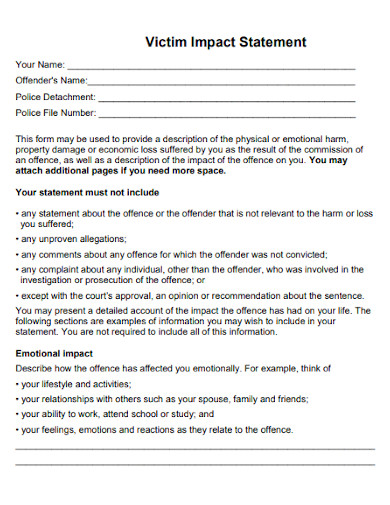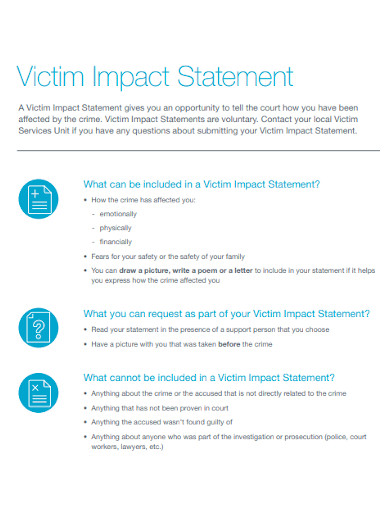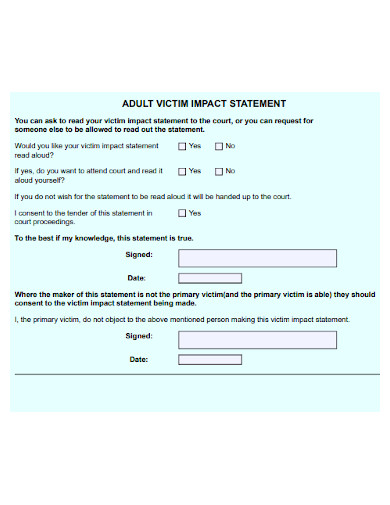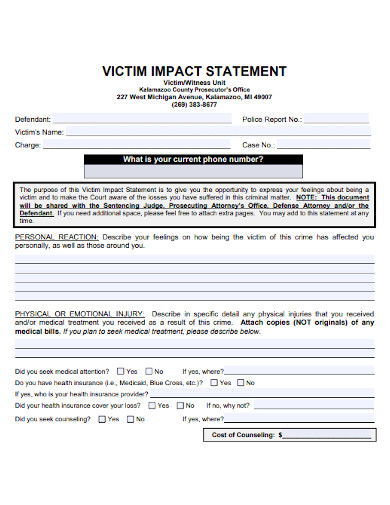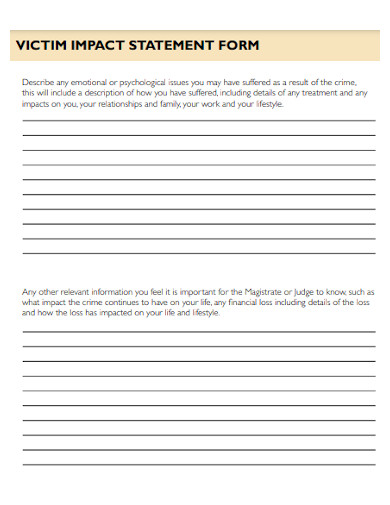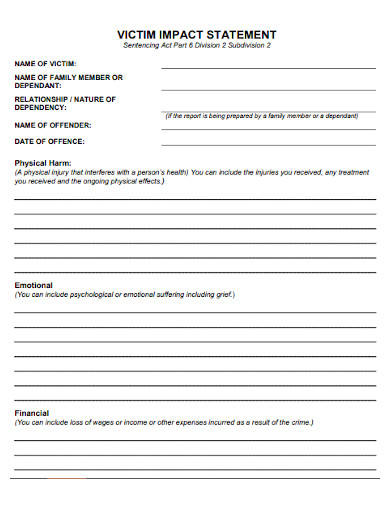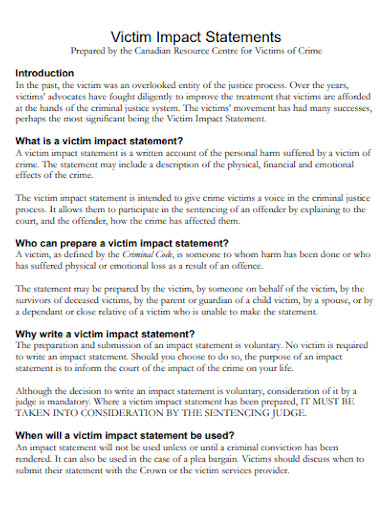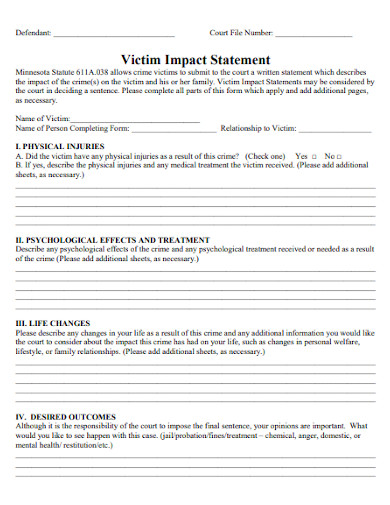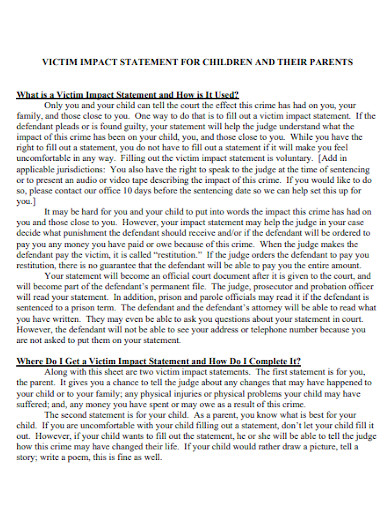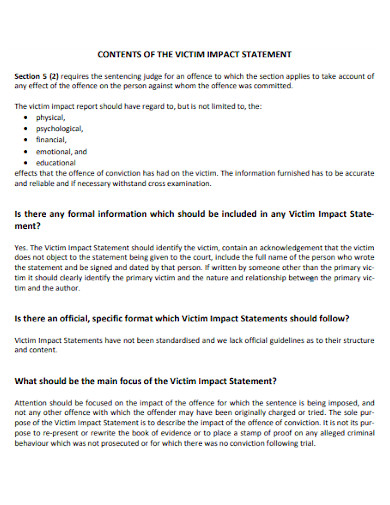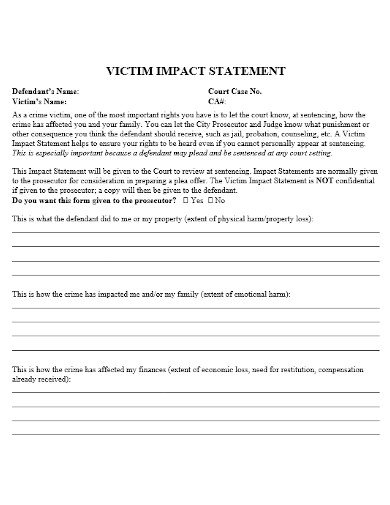10+ Victim Impact Statement Examples to Download
Many victims of heinous crimes and injustice often do not get a say or a word out there to tell their stories. This is the sad reality for some of them, especially when they do not have someone to believe or to back their story. When you think about it, the majority of victims who do have the opportunity to give their statement can make a huge impact on those who are listening. Whereas to those who choose to stay silent and let it be. For those who do have the chance to get their statement out there, there are some things that you have to take into consideration. One is the facts of their story and how much it is going to make a huge impact on change. With that being said, here are examples of victim impact statements.
10+ Victim Impact Statement Examples
1. Victim Emotional Impact Statement
2. Victim Impact Services Statement
3. Adult Victim Impact Statement
4. Defendant Victim Impact Statement
5. Victim Impact Statement Form
6. Victim Impact Division Statement
7. Victim Impact Crime Statement
8. Victim Impact Court Statement
9. Victim Impact Statement for Children
10. Contents of Victim Impact Statement
11. Editable Victim Impact Statement
What Is a Victim Impact Statement?
A victim impact statement is a kind of statement or a document that focuses on the victim’s story and experience of what they have gone through. The document will also focus on either the physical, mental, emotional, and financial impact on what the victim went through. Victim impact statements can be done in two ways, the most common of which is a written impact statement. The other is an oral statement that is often used in court or when the victim is planning on filing for it at the police station. The general purpose of a victim impact statement is for the victim to be able to tell their side of the story of what happened to them against the perpetrator.
How to Write a Victim Impact Statement
As we are aware, a victim impact statement is a very important document or statement that the victim either writes or states. In a way, it also helps the victim reflect on how they may want to present their statement. How it is presented or written will also make a huge difference. There are a lot of ways to make a victim impact statement. One of the most common ones is for the victim to fill out a form. However, in a different approach to the impact statement, you will need to follow a set of instructions or steps to make your own victim impact statement from scratch.
1. Stick to the Facts You Know
It is understandable as the victim that you may want to write down a story that may sound better than the one you have experienced. But the main goal here is to write the facts and not some other random things you may want to add in there. Facts are necessary for those in charge to understand and find a solution that will work best for you as the victim. So as you begin, remember to stick to the facts.
2. Remain Neutral in Your Writing
The reason for remaining neutral is to make sure that your emotions like blaming the defendant will not get the best of you. It is understandable that as the victim, emotions will run through, but it may not be able to help you with your case. Remaining neutral and professional by simply writing what happened to you is best. Explaining how you felt during the time is also best, but how you are currently feeling should not be placed in your statement.
3. Use a Suitable Language
Using vulgar language should be avoided when you are writing your side of the story regardless of how you may be feeling at that moment or how you are feeling right now. Vulgar language is a huge no in your impact statement. You must know that there is a possibility that you will be reading your statement in court, and having someone listen to you using vulgar language may not help with your case. Avoid it at all costs.
4. Reread Your Impact Statement
Reviewing your impact statement will help. Just to make sure that you have written out your side of the story in complete detail or what you may have remembered. It also helps you check whether you have used appropriate language and other information that you may have missed can still be written in.
FAQs
What is a victim impact statement?
A victim impact statement is a kind of statement or a document that focuses on the victim’s story and experience of what they have gone through. The document will also focus on either the physical, mental, emotional, and financial impact on what the victim went through.
How does one write a victim impact statement?
The most important thing to remember when you are writing a victim impact statement is to stick to the facts that you remembered or know. Facts are important and can weigh more than other unnecessary information in the statement.
What is something that you should avoid?
Using vulgar language should be avoided when you are writing your side of the story regardless of how you may be feeling at that moment or how you are feeling right now. Vulgar language is a huge no in your impact statement.
Victims of heinous crimes and wars often do not have the opportunity or the resources to tell their stories. But when they do, their impact statement speaks volumes. How they may present their story should also be in a direct, no-nonsense approach. As well as to use suitable language in their statement. Vulgar language is prohibited.



